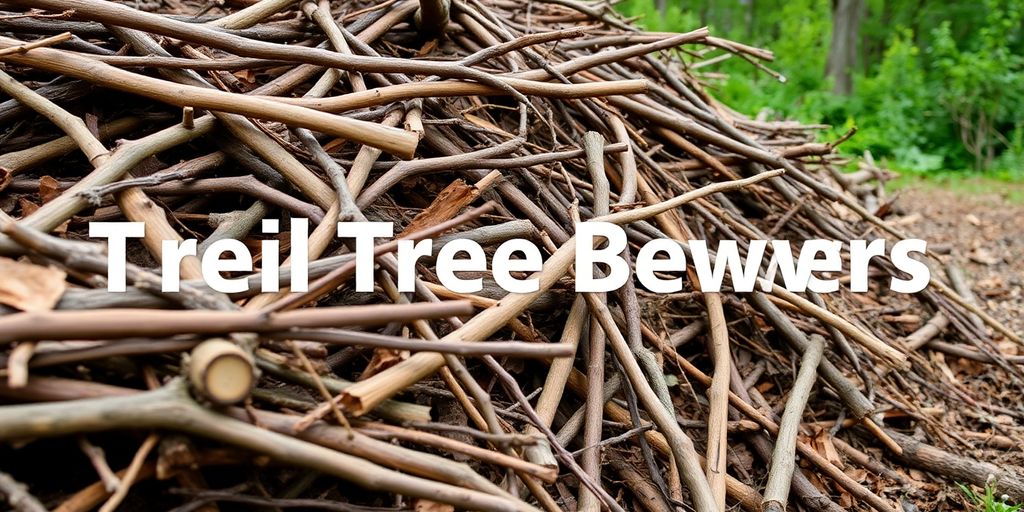If you have tree branches piling up in your yard, figuring out how to dispose of them properly is important. This guide will help you understand your options for getting rid of tree debris in an eco-friendly way. From local landfills to creative repurposing ideas, there are many ways to handle tree branches responsibly.
- Where to Get My Child Tested for Autism Near Me: Finding Local Evaluation Services
- Discover Where Oppenheimer is Playing Near Me: Your Ultimate Guide to Showtimes and Locations
- Where to Find Who Sells DEF at the Pump Near Me: A Comprehensive Guide
- Discover the Best Family Restaurants Near Me for Memorable Dining Experiences
- Discovering Hidden Natural Places Near Me: A Guide to Local Wonders
Key Takeaways
- Local landfills often accept tree branches and may recycle them into mulch.
- Composting and using wood chippers are great eco-friendly options for tree debris.
- Hiring professionals can save time and ensure safe removal of large branches.
- DIY methods like renting a dumpster or creating a burn pile are also viable.
- Always check local regulations before disposing of tree debris to avoid fines.
Local Landfills and Recycling Centers
When it comes to disposing of tree branches, local landfills and recycling centers are often the best options. They provide a straightforward way to get rid of yard waste while promoting eco-friendly practices.
You are viewing: Where Can I Dump Tree Branches Near Me: Your Ultimate Guide to Local Disposal Options
Finding Your Nearest Center
To locate the nearest landfill or recycling center, you can:
- Check your city or county’s waste management website.
- Call local waste management services for guidance.
- Use online maps to find facilities nearby.
Accepted Materials and Fees
Most landfills accept a variety of materials, including:
- Tree branches and yard waste
- Household trash
- Construction debris
Here’s a quick overview of typical fees:
| Material Type | Fee (per ton) | Additional Notes |
|---|---|---|
| Yard Waste | $30 | May vary by location |
| Household Trash | $50 | Includes general waste |
| Construction Debris | $70 | Higher fees for larger items |


Benefits of Recycling Tree Branches
Recycling tree branches has several advantages:
- Reduces landfill waste: Helps keep landfills from overflowing.
- Creates mulch: Recycled branches can be turned into mulch for gardens.
- Supports local ecosystems: Recycling contributes to healthier soil and plant life.
Remember, using local landfills and recycling centers not only helps you dispose of waste but also supports community sustainability efforts.
By understanding your options, you can make informed decisions about tree branch disposal.
Eco-Friendly Disposal Options
When it comes to getting rid of tree branches, there are several eco-friendly methods you can choose from. These options not only help the environment but also make good use of the materials you have.
Composting Tree Branches
- Composting is a great way to recycle tree branches. You can break them down into smaller pieces and add them to your compost pile. This process enriches the soil and helps plants grow.
- If you don’t have a compost pile, many local facilities accept tree debris for composting.
- Check with your local waste management for nearby composting options.
Using Wood Chippers for Mulch
- Wood chippers can turn branches into mulch, which is useful for landscaping.
- You can rent a wood chipper or hire a service to do it for you.
- Mulch helps retain moisture in the soil and prevents weeds from growing.
Community Mulching Facilities
- Many communities have mulching facilities where you can drop off your tree branches.
- These facilities often turn the branches into mulch that is available for free or at a low cost.
- This not only helps you dispose of your waste but also supports local gardening efforts.
Remember, using eco-friendly disposal methods not only benefits your yard but also contributes to a healthier environment for everyone.
| Disposal Method | Benefits |
|---|---|
| Composting | Enriches soil, reduces waste |
| Wood Chipping | Creates mulch, conserves water |
| Community Facilities | Supports local gardening, often free |
Tree Debris Removal Services
Hiring Professional Services
When you have a lot of tree debris, hiring professionals can save you time and effort. They have the right tools and experience to handle everything safely. Here are some reasons to consider professional help:
- Safety: They know how to handle heavy branches and equipment.
- Efficiency: They can clear your yard quickly.
- Expertise: They understand local regulations for disposal.
Municipal Yard Waste Programs
Many towns offer yard waste programs that can help you get rid of tree branches. These programs often include:
- Scheduled pickups for yard waste.
- Drop-off locations for larger debris.
- Special collection days after storms.
Cost of Tree Debris Removal
Read More : Who Buys Junk Cars Without Title Near Me? Discover Local Cash Offers!
The cost for tree debris removal can vary based on several factors. Here’s a quick breakdown:
| Service Type | Average Cost |
|---|---|
| Small Branch Removal | $75 – $150 |
| Large Branch Removal | $150 – $300 |
| Stump Removal | $80 – $250 |
Understanding these costs can help you budget better. Contact the top tree debris removal near me to get quotes and find the best service for your needs.
DIY Tree Branch Disposal Methods
Renting a Dumpster
If you have a lot of tree branches to get rid of, renting a dumpster can be a great option. Here’s how to do it:
- Contact a local waste management company to find out about dumpster sizes and rental fees.
- Choose a size that fits your needs. Common sizes include 10, 20, and 30 yards.
- Fill the dumpster with your tree branches and other yard waste.
- Schedule a pickup when you’re done.
Creating a Burn Pile
Creating a burn pile is an option, but it should be your last resort. If you decide to burn:
- Check local regulations to ensure it’s allowed.
- Choose a safe location at least 150 feet away from buildings.
- Burn on a calm day to prevent spreading fire.
Burning should only be done if you can follow safety guidelines. Always prioritize safety and legality.
Repurposing Branches for Firewood
Instead of throwing away your branches, consider using them as firewood. Here’s how:
- Cut branches into manageable sizes for your fireplace or fire pit.
- Store the wood in a dry place to prepare for colder months.
- Avoid using green wood, as it produces more smoke when burned.
By following these methods, you can effectively manage your tree branches while being mindful of safety and local laws. Remember to always check your local guidelines before proceeding with any disposal method!
Safety Tips for Tree Debris Removal
Assessing Risks Before Removal
Before you start cleaning up tree debris, it’s important to assess the risks involved. Look for any leaning trees or branches that could fall. Be especially careful around power lines that might be nearby. If you see large, unstable sections, you might need to use a crane to handle them safely.
Essential Tools and Equipment
Using the right tools can make your job easier and safer. Here’s a list of essential equipment:
- Chainsaws: Make sure they are sharp and in good condition.
- Chippers: These help break down branches for easier disposal.
- Cranes: Necessary for lifting heavy pieces of wood safely.
- Stump Grinders: Useful for removing tree stumps properly.
Handling Large Branches Safely
When dealing with large branches, follow these safety tips:
- Wear protective gear: Always use gloves, goggles, and a hard hat.
- Establish a safety zone: Keep a clear area around where you’re working.
- Follow cutting techniques: Use proper methods to avoid accidents.
- Dispose of debris safely: Make sure to follow local guidelines for disposal.
Remember, safety first: protecting yourself during tree debris removal is crucial. Take your time and don’t rush the process.
Local Regulations and Guidelines
Understanding Municipal Policies
When it comes to local regulations on tree debris removal, it’s important to know the rules in your area. Each municipality has its own set of guidelines that dictate how tree branches and other yard waste should be disposed of. Here are some key points to consider:
- Check local laws: Always verify the specific regulations in your city or county.
- Know the disposal methods: Understand what methods are allowed for tree debris removal.
- Stay informed: Regulations can change, so keep up with any updates from local authorities.
Permits for Dumpster Placement
If you plan to rent a dumpster for tree branch disposal, you may need a permit. Here’s what to keep in mind:
- Contact local authorities: Reach out to your city or county office to inquire about permit requirements.
- Follow placement rules: Ensure the dumpster is placed in a location that complies with local guidelines.
- Check for fees: Some municipalities may charge a fee for dumpster permits.
Legal Considerations for Burning Debris
Burning tree branches can be an option, but it comes with strict regulations. Here are some legal considerations:
- Check burn bans: Some areas have seasonal burn bans due to fire risks.
- Obtain necessary permits: You may need a permit to burn yard waste.
- Follow safety guidelines: Always adhere to safety protocols when burning debris to prevent accidents.
Understanding these regulations is crucial for homeowners, contractors, and communities to ensure compliance and avoid penalties. Stay informed to make the disposal process smoother and more responsible.
Creative Ways to Repurpose Tree Branches
Building Animal Habitats
Read More : Discover the Best Restaurants Near Me for Dinner: A Culinary Adventure Awaits!
You can use tree branches to create safe spaces for local wildlife. Consider making habitat piles, which can attract birds, small mammals, and even reptiles. Just be cautious about where you place them to avoid unwanted visitors in your home.
Crafting Garden Furniture
If you enjoy DIY projects, tree branches can be transformed into unique furniture. Here are some ideas:
- Chairs from large stumps
- Benches around fire pits
- Tables made from thick branches
This not only saves money but also adds a rustic charm to your yard.
Creating Natural Pathways
Tree branches can also be used to enhance your garden. You can:
- Chop branches into slices for stepping stones.
- Lay logs along garden paths for a natural look.
- Use stumps as whimsical seating.
Repurposing tree branches not only helps the environment but also sparks creativity in your outdoor space.
Simple Wooden Objects
If you’re crafty, consider making small items like:
- Coasters
- Picture frames
- Decorative signs
These projects can turn waste into beautiful, functional pieces for your home.
Final Thoughts on Tree Branch Disposal
In conclusion, knowing how to dispose of tree branches is important for keeping your yard clean and safe. Whether you choose to take your branches to a landfill, use a recycling center, or hire a service, there are many options available. Remember, recycling is a great way to help the environment. If you have a lot of branches, renting a dumpster or scheduling a pickup can make things easier. Always check local rules to find the best way to get rid of your tree debris. With the right approach, you can manage your yard waste effectively and keep your outdoor space looking great.
Frequently Asked Questions
What should I do with tree branches after trimming?
After trimming tree branches, you can take them to a local landfill, recycling center, or compost them if your area allows it.
Are there free services for picking up tree debris?
Yes, some cities offer free tree debris pickup after storms or during special yard waste collection times. Check with your local waste department.
How much does it usually cost to remove tree branches?
The cost for removing tree branches can range from $75 to $500, depending on how much debris you have.
Can I burn tree branches in my backyard?
You can burn tree branches, but make sure to check local laws and safety guidelines first to avoid any issues.
What are some DIY methods for disposing of tree branches?
You can rent a dumpster, create a burn pile, or use a wood chipper to turn branches into mulch.
Do local waste services pick up tree branches?
Many local waste services do pick up tree branches as part of their yard waste program, but it’s best to confirm with them.
Soure: https://herego.net
Category: near me


